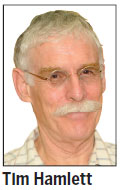A great missed opportunity in reforming education system
Updated: 2014-07-14 06:49
By Tim Hamlett(HK Edition)
|
|||||||||
I do not set much store by league tables. Comparing countries or universities is not like comparing football teams. Small changes in the assumptions and inputs can produce big changes in outcomes. Still as Hong Kong is accused of sliding slightly in the competitiveness championships it is worth taking a closer look at why. The recurring complaint is that the Hong Kong education system is not producing the sort of people the city needs.
And here we must lament a great missed opportunity. It is difficult to get academic administrators to recognize that the energy and money spent on one objective cannot be devoted to another. If you are driving towards a fork in the road and you ask "right or left?" The common academic answer is "both". The handover was a chance to do great things with our local education system. The world was to be made anew, there was excitement, goodwill, an eagerness to show what we could do when freed from colonial shackles and other platitudes.
Choices were duly made, and those choices were regrettable. At kindergarten level, vouchers were introduced, with the entirely predictable result that the kindergartens all put their prices up. At primary level we introduced a system of periodic official inspections, with the results to be published for potential parents. The consequences of this were to divert a great deal of time and energy from educational purposes to the pursuit of flattering inspection reports. There is a role for regular inspections, but in educational contexts - and this goes for universities as well - they produce orgies of lily-gilding which have little or nothing to do with the way the institution operates the rest of the time.

Further up the age scale we chose (or someone chose) to change from 7-3 to 3-3-4. In other words the last year of school under the old system was replaced by an extra year at university, for those who manage to get there. This required the introduction of a new examination system, together with the concomitant large financial outlay. Replacing a year at school with a year at university is clearly more expensive. In the early days of the process this was to be off-set by the reduction in spending by schools. But the political imperative to keep the support of secondary school principals soon produced a promise that schools would not lose a penny, while universities were naturally asking for a 25 percent increase in funding and accommodation to match their newly increased population.
The point about these initiatives is not just that they were not in themselves particularly helpful, but that the devotion of effort and cash for them explains why we have neglected other matters, which routinely come up when discussing competitiveness and Hong Kong's economic prospects.
One is the matter of English. I do not propose to discuss whether our students need English or not, an interesting topic, but having decided to provide it we ought to do better than we do now, considering the time and effort devoted to the subject. Some countries manage to teach foreign languages to most of their citizens with great success. Our education officials, having been vigorously rebuffed by parents over the question of language of instruction, seem to have given up in a huff.
The second is the teaching of technical and practical subjects. With the introduction of 3-3-4 all kids were to be offered an extra year of schooling. It was widely recognized that many of them would not benefit from and would not be interested in preparing for an examination which was primarily intended to test their fitness for university. What has happened in practice is that in Band 3 schools they pursue exactly the same curriculum in much the same way as in Band 1 schools, with the distressing corollary that many students spend a lot of time preparing to fail an examination which was never designed for them in the first place.
The author's work in journalism has won him honors in the Hong Kong News Awards and the International Radio Festival of New York. He is well known as a columnist, reviewer and broadcaster.
(HK Edition 07/14/2014 page9)